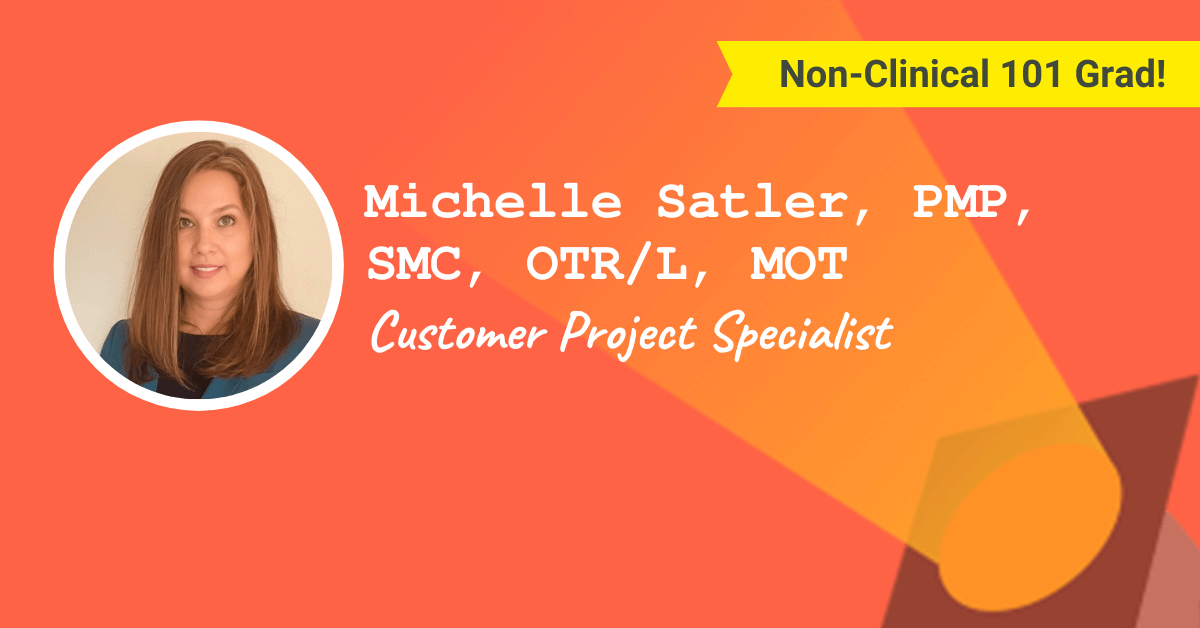This week’s spotlight is on Michelle Satler, PMP, SMC, OTR/L, MOT, a Non-Clinical 101 graduate who is now Customer Project Specialist for Cisco!
This post may contain affiliate links or codes. This won’t increase your cost, but it helps keep TNCPT alive, and free of annoying ads! Thank you for your support. 🙂
What is your full name, title, and company name for your current, primary role?
Michelle Satler, PMP, SMC, OTR/L, MOT — Customer Project Specialist for Cisco

What additional roles do you currently have?
Project Manager. My job title is Customer Project Specialist, but I am referred to as a project manager within my projects.
Where are you located?
Philadelphia suburbs.
Please refrain from contacting our spotlight participants on social media. There are thousands of readers just like you out there. 🙂 Please ask your questions in the comments on this blog post.
If you’re a Non-Clinical 101 student, you can network with many of our spotlight participants in the alumni groups!
Where did you go to OT school, and what year did you graduate?
Eastern Kentucky University, 2013.
What did you do when you first finished school, and for how long?
I worked in outpatient OT, in the home and in the clinic. Then, I worked in schools, Pre-K through high school.
In what setting(s) did you work, and what types of patients did you treat?
Most of my therapy time was spent in brick-and-mortar schools serving children with a variety of pediatric conditions affecting fine motor, visual motor, self-care, and executive-functioning skills.
What did you enjoy about your early roles? What didn’t you enjoy?
I really enjoyed working with the children and having a positive impact on their development.
There was lots of paperwork, as well as challenges with resources. There were also very limited opportunities for growth.
What else have you done since then, prior to your current role?
I spent the last two years of my clinical career serving students in a virtual OT setting.
When and why did you decide to do something non-clinical?
I had spent a decade in patient care and wanted to grow. I interviewed for and researched other opportunities for OTs. At the time, I found limited opportunities within healthcare and healthtech. I was recruited by my current company and saw a path for continued growth.
What are you doing these days?
I currently manage up to five technical and customer-facing projects within the Global Enterprise Segment for one of Cisco’s premier customers.
I lead projects from kickoff to completion. I ensure all projects align with the company’s strategic goals and are delivered on time, within scope, and on budget. This is done through meticulous planning, risk management, and resource allocation.
Are you still treating patients, or are you solely non-clinical?
I am solely non-clinical.
How long have you been in your current customer project specialist role?
Since June 2023.
Did you get any special certifications or training along the way to help you get into your current role?
I started with the Non-Clinical 101 course to explore my options.
I also completed a Computer Information Systems (CIS) certificate to explore fields further. I ended up completing a master’s degree in CIS with a project management concentration.
How did you find your job? Did you apply or find it through a connection?
I spent a lot of time researching and networking. My current position was obtained through recruitment at the university where I earned my certificate and master’s degree.
Did you do anything special to your resume and cover letter to land the job?
I reviewed resumes in Non-Clinical 101. I also watched a video featuring a therapist that had moved to project management, and she recommended removing the OT/PT credential from your resume.
That encouraged a painful rewrite of my resume without my hard-earned credentials, but I ultimately think that helped recruiters see my skills beyond OT more clearly.
What was the interview like for the customer project specialist role?
I was able to use my clinical experience to describe working with teams and managing challenging situations.
Every client we work with as a therapist is essentially a mini project.
What are some of the things you did to stand out, take initiative, and advance in your career?
I recently completed my Project Management Professional (PMP) certification.
How have people reacted to you leaving patient care?
I have received a lot of support from those that I previously worked with. New colleagues outside of healthcare are sometimes surprised to hear about the transition.
What’s a typical day or week in the life like for you? What types of tasks and responsibilities fill your time?
I lead A LOT of meetings. I am constantly in communication with stakeholders to ensure projects are on track.
I constantly tap into my therapist problem-solving and collaboration skills.
I work remotely, so I can take my work wherever I have a good internet connection. Due to recurring customer calls, I do have a fairly set weekly schedule.
What are some of the rewards of your role? What are the biggest challenges?
There are lots of opportunities for growth, and there are lots of challenges to work through with projects. I stay very busy.
How did your clinical background prepare you for this role? Which skills transferred?
With the exception of my purely clinical and medical knowledge, I use all of my therapist skills throughout the day.
Being a multi-tasking, problem-solving OT is great practice for being a project manager.
Roughly speaking, how are the hours and pay compared to patient care?
I have opportunities for promotions and compensation much higher than opportunities I would have had as an OT or Director of OT.
What type of person do you think would do well in your customer project specialist role?
Project management (PM) definitely requires someone to be detail-oriented and able to multi-task. You must be comfortable leading frequent meetings and teams.
Does your organization hire PT, OT, or SLP professionals into non-clinical roles? If so, what type of roles?
Project managers that come into Cisco’s Associate Project Manager Academy come from a variety of backgrounds.
Did you read any books, take any courses, or do anything special overall to get you where you are today?
I took Non-Clinical 101, some Google PM courses, and earned my master’s degree in CIS with a concentration in PM.
My company also provided formal PM training during onboarding.
What is a typical career path for someone in your customer project specialist role?
A typical career path can include roles such as: project specialist, project manager, and program manager.
What is next for you? What are your high-level career aspirations?
My high-level career aspirations are to continue to grow and lead programs.
What would you recommend to someone who is considering going into a role like yours? Do you have any special words of wisdom for the readers?
Network with others in the role, especially those transitioning from a non-clinical background.
Review the previous highlights from Non-Clinical 101, and connect with others in groups.
What would you like to change most in your profession, and why?
There is a lot of really great talent leaving the healthcare field, as there are limited opportunities for therapists (OT/PT/SLP) to grow beyond direct clinical care.
Do you have any special advice for others who want to follow in your footsteps?
An OT/PT/SLP already has a tremendous amount of core skills needed for PM. Research the profession to learn the language to communicate your value, and go for it.





